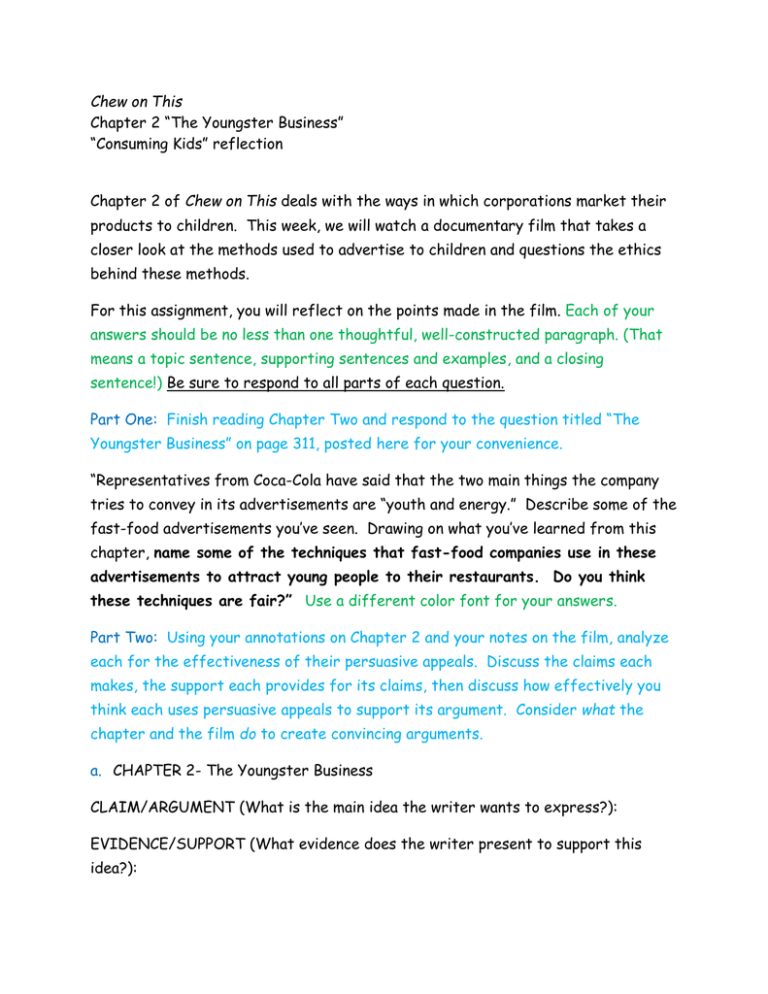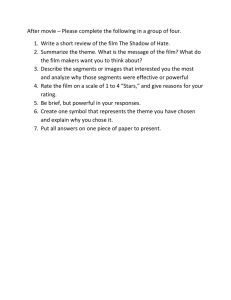Chew on This Chapter 2 “The Youngster Business” “Consuming
advertisement

Chew on This Chapter 2 “The Youngster Business” “Consuming Kids” reflection Chapter 2 of Chew on This deals with the ways in which corporations market their products to children. This week, we will watch a documentary film that takes a closer look at the methods used to advertise to children and questions the ethics behind these methods. For this assignment, you will reflect on the points made in the film. Each of your answers should be no less than one thoughtful, well-constructed paragraph. (That means a topic sentence, supporting sentences and examples, and a closing sentence!) Be sure to respond to all parts of each question. Part One: Finish reading Chapter Two and respond to the question titled “The Youngster Business” on page 311, posted here for your convenience. “Representatives from Coca-Cola have said that the two main things the company tries to convey in its advertisements are “youth and energy.” Describe some of the fast-food advertisements you’ve seen. Drawing on what you’ve learned from this chapter, name some of the techniques that fast-food companies use in these advertisements to attract young people to their restaurants. Do you think these techniques are fair?” Use a different color font for your answers. Part Two: Using your annotations on Chapter 2 and your notes on the film, analyze each for the effectiveness of their persuasive appeals. Discuss the claims each makes, the support each provides for its claims, then discuss how effectively you think each uses persuasive appeals to support its argument. Consider what the chapter and the film do to create convincing arguments. a. CHAPTER 2- The Youngster Business CLAIM/ARGUMENT (What is the main idea the writer wants to express?): EVIDENCE/SUPPORT (What evidence does the writer present to support this idea?): INTERPRETATION OF USE OF PERSUASIVE APPEALS (What does the writer do in terms of craft and persuasive techniques to create a convincing argument? Is his use of these techniques effective? Why or why not?): How would you describe the TONE of this chapter? Why? --------------------------------------------------------------------------------------------b. “Consumer Kids” CLAIM/ARGUMENT (What is the main idea the filmmakers want to express?): EVIDENCE/SUPPOR (What evidence do the filmmakers present to create a convincing argument?): INTERPRETATION OF USE OF PERSUASIVE APPEALS (What do the filmmakers do in terms of craft and persuasive techniques to create a convincing argument? Is this use of these techniques effective? Why or why not?): How would you describe the TONE of this film? Why? --------------------------------------------------------------------------------------------Part Three: Using the notes you took during the film viewings, respond to the following prompts. Use a different color font for your answers. 1. What information presented in the film did you find most interesting, surprising or disturbing? Select three points from the film and explain why these examples stood out to you. 2. a. What are focus groups? Discuss how focus groups are presented in the film. What do you think about the methods used by these focus groups that research children and teens? b. The film discusses “stealth marketing” which involves companies providing kids with products to enjoy with their friends while at the same time advertising these products. These kids are also expected to observe how their friends interact with the products and to report this information back to the companies. Discuss the examples presented in the film and share your reaction to and opinions on these techniques. c. “Consuming Kids” discusses ethnographic monitoring, in which marketing researchers follow and observe children to learn more about how to sell to them. The film also discusses “neuromarketing” research, which involves monitoring children’s brain function as they interact with products and view advertisements so that the marketers can alter these products and ads to be more mesmerizing and persuasive. What are you opinions on each of these research methods? 5. In “Consuming Kids” one expert suggests that children have a powerful influence over their parents’ purchasing choices particularly on items such as cars, computers, phones and even vacations. Do you agree? How much influence do you think you have on your parent’s purchasing choices? Provide an example to support your answer. 6. In “Consuming Kids” the point is made that excessive, aggressive marketing to children is causing them to grow up too fast. Do you agree or disagree with this statement? Use examples from the films and from your own experience to support your opinion. 7. The film suggests that advertisers are trying to sell more than products; they are trying to sell values. Products are pushed based on their social meaning or what is considered “cool”, not on what they can do. One expert says that marketers send the message that “What you buy is what you are. You are what you have. You are what you own. If you don’t have it, you are less than.” What are your thoughts on these statements? Have you ever experienced these feelings? Do you think you or your friends are influenced by the media’s standards of “cool”? If so, how? Are there ways to be cool without copying what you see in the media? What do you have to say to those in the film that claim you are unoriginal and merely a reflection of what marketers have told you that you should be- that you like what you like because marketers told you to? 7. Research discussed in “Consuming Kids” suggests that the large increase in problems such as obesity, ADHD, bi-polar disorder, depression, diabetes and hypertension in children and teens may be strongly connected to advertising and marketing and that the more media children are exposed to, the more likely they are to suffer from depression and anxiety. Comment on this data. 8. The film acknowledges critics who claim that advertisers should not be regulated when it comes to marketing to children. These critics believe that parents should simply be responsible for what their children are exposed to. One expert from “Consuming Kids” makes the point that parents simply cannot contend with or counteract the damage from mass media alone. What are your thoughts on this debate?




